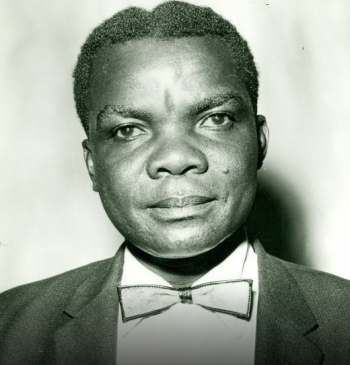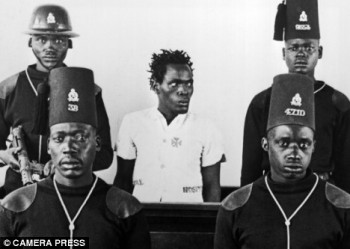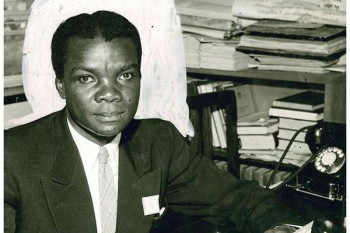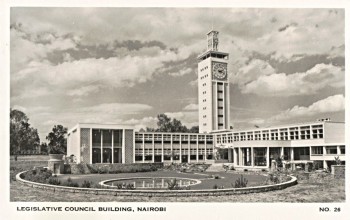Argwings Kodhek (1923-69)
The 'Mau Mau lawyer' and Luo politician with a debated reputation for the defence of human rights.

Argwings Kodhek was born in 1923, shortly after Kenya became a British colony, in present day Siaya County, Gem constituency in Malanga, Gem location. He hailed from Kogolo-ojuodhi clan which is one of the most influential in the region. His baptismal name was Clement Michael George which was localized to ‘Chiedo Mor Gem’ which means ‘cooked/fried in Gem’. He attended a local missionary school and later joined St. Mary Yala for his Cambridge certificate before proceeding to St Mary Kisubi College and then Makerere. He returned to Kenya where he taught at Kapsabet boys which was then in Rift Valley province until 1947. While in Kapsabet, he met Daniel Moi who later became a member of legislative council, vice president and president of independent Kenya. Kodhek then became the first Kenyan to open a private law firm in 1957 at the height of Mau Mau resistance. He married a white woman, Mavis Tate, despite the prohibition of mixed-race marriages by colonial legislation, which he successfully battled in court. However, they could not live together in certain areas due to segregation laws which prohibited Africans from settling in the white neighbourhoods of Lavington, Karen and Muthaiga, hence they settled at Ruaraka. Later he divorced his Irish wife and married Joan Omondo, who died in 2013.
Global Connections
From 1937 to 1940, Kodhek studied for a diploma in education at Makerere College, where other prominent East Africa leaders, including Milton Obote, Mwalimu Julius Nyerere, Kabaka Mutesa II and Mwai Kibaki had also studied. This was his first exposure to the outside world where he interacted with other Africans in the region, exchanging views concerning the state of colonialism in the continent. He later earned a government scholarship to study social science at the University of Cardiff. However, his desire to study law led to termination of his scholarship after one year, and he proceeded to pursue a degree in law through financial support of his parents at the University of St. Andrews.
He became a barrister and was admitted to the prestigious Lincoln's Inn, an astonishing achievement for Africans at the time. Kodhek was the first East African to graduate with a degree in law shortly before declaration of state of emergency in Kenya. His graduation in law coincided with the formation of Jomo Kenyatta’s Kenya African Union (KAU) in 1951, which demanded independence within three years. Kodhek left a well-paying job in the UK to come and join the political struggle in Kenya in 1952 – to the surprise of his friends.

While studying in the UK, he was involved in debates about concepts such as democracy, human rights and equality, values that he endeavoured to domesticate in his home country. For instance, campaigning for democracy, he gave a defiant speech in Bahati (Nairobi) for Kenyan independence: ‘this country has eight million Africans and if we want freedom we want it now’. As a human rights defender, he argued that ‘human rights are indivisible and freedom cannot be appropriate in the west and inapplicable in Africa’. He insisted on the principle of natural justice as applied to western nations and Europeans in Africa. Therefore, he embarked on defending Mau Mau fighters with great success. He took most cases under pro bono services in various areas in central and Nairobi province colonial courts. For instance, he successfully helped 48 people accused in the Lari massacre, which led to the killing of Chief Luka Kahangara, according to Bethwell Ogot. Secondly, he successfully defended Waruru Kanja, who later became an MP and minister from being convicted of capital offense during the struggle for independence. In fact, Kodhek, Achieng Oneko and Ekana Ereko have been used to show ethnic diversity in Mau Mau movement. This led to Western press labelling him a ‘Mau Mau lawyer’ and his was consequently debarred in 1957.
In addition, he build important networks with journalists and members of parliament in the UK and used these connections to bring the Hola massacre to international stage when colonial government tried to cover it up. This was through House of Commons and press networks he had established while studying in the UK. He described colonial brutalities against African detainees committed on behalf of the British government, comparing the massacre to Nazi concentration camps, leading to international uproar.

Furthermore, he joined the labour movement after the banning of political parties, just like Mboya and other nationalists with global connections. In the labour unions, he was able to advocate for better working conditions for Africans, which can be partially attributed to his training as a lawyer. In fact, after joining the state law office together with Charles Njonjo, who later became the first African attorney general, he left in protest of equal work for equal pay since he was paid three times less than his European counterpart.
Later, during the 1957 election, he painted Mboya as an America stooge in response to his international connections, while casting himself as a nationalist. During the Cold War era, he tried to bridge the gap between Jaramogi Oginga and Tom Mboya who, broadly speaking, sympathised with USSR and USA political standpoints respectively. Kodhek did not align himself with either bloc, casting himself as a diplomat and rising to become Minister of Foreign Affairs.
Political Life
His political activities spanned the colonial period to the early days of independent Kenya. He started his political career in Nairobi during the state of emergency, where he joined the trade unions after the ban of KAU. He formed the Nairobi African District Congress which lost against Tom Mboya’s Nairobi People’s Convection. The loss made him lose interest in urban politics and redirect his political activities to Luo Nyanza upon independence. He was also one of the legal minds of the Kenya African National Union (KANU) during the Lancaster House conferences, where he helped to deal with legal implications. He was therefore accepted as a Luo leader among others like D.O. Makasembo, Tom Mboya and Jaramogi Oginga. He was the first Member of Parliament in Gem constituency where he associated himself with KANU politics.

Kodhek held various posts such as founder and president Nairobi District African Congress in 1956, Member of the Legislative Council 1961-3, Minister of Lands, Surveys and Town Planning in 1962. In the Kenyatta government, Kodhek served in various posts including Parliamentary Secretary to Ministry of Health and Housing, 1963, and Assistant Minister, Ministry of Internal Security and Defence, from 1964. He later became Minister of Natural Resources in 1966 and Minister of Foreign Affairs in 1967, a post he held until his death. In parliament, he was an eloquent debater, especially on matters of nationalism as evident in 1965 budget speech: ‘I must beseech all members and pray that we shall have, as what Germans say, “Kenya above all”’. However, his critics claim that history will not absolve him and others for supporting Kenyatta regime, which at times had undemocratic tendencies such as banning opposition parties and silencing critics. Kodhek died a mysterious death in a car accident at a road that was later renamed Argwings Kodhek Road on 29 January, 1969. In 1983, President Moi’s Jamhuri Day speech recognised Kodhek among other nationalists such Jomo Kenyatta, Tom Mboya, Koinange and Ronald Ngala.
Archives and online sources
- Kenya National Archives, Nairobi, Kenya
- Macmillan Library, Nairobi, Kenya
- Kenyatta University Library, Nairobi, Kenya
- Daystar University, Nairobi, Kenya
- Kenya Parliament Hansard online http://www.parliament.go.ke/the-national-assembly/offices/hansard-department
- The Weekly Review
- The Standard
Further Reading
- E. S. Atieno Odhiambo and John Lonsdale (eds.), Mau Mau & Nationhood : Arms, Authority & Narration (Oxford: James Currey, 2003).


